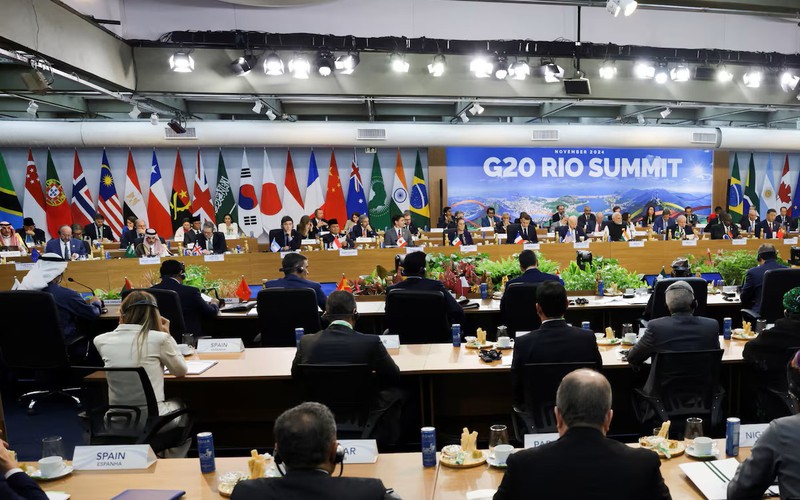Opportunity to enhance the position of the Global South
South Africa will officially assume the presidency of the Group of 20 leading emerging and developed economies (G20) from December 1. As the first African nation to take over the “hot seat” of the G20, South Africa is expected to play a crucial role in elevating the position of Global South countries in efforts to address global challenges.
 |
| The 2024 G20 Summit in Rio de Janeiro, Brazil. |
Choosing the theme “Fostering Solidarity, Equality and Sustainable Development” for its G20 presidency, South Africa plans to implement key objectives. This includes promoting the implementation of sustainable development goals (SDGs) and the African Union (AU)’s Agenda 2063, in addition to addressing public debt issues of Global South countries, reforming the international financial system, combating climate change and advancing just energy transition and preventing the exploitation and depletion of raw materials and minerals in Africa.
A look at the key objectives shows that developing countries hold a central position in the G20 agenda for 2025. In his speech accepting the G20 presidency from Brazil, South African President Cyril Ramaphosa emphasised that the country will prioritise bringing Africa’s and the Global South’s development issues to the G20 agenda.
Analysts note that South Africa has advantages in realising these objectives. First, the “Global South fever” has recently attracted special attention from the international community. German Chancellor Olaf Scholz has affirmed that the world is witnessing a major shift in global structure as developing countries increasingly assert their position and important role in addressing common challenges. The joint declaration of the BRICS Summit, held in Russia, also called for giving a greater role to the Global South in global decision-making processes.
South Africa inherits India and Brazil's achievements from their previous G20 presidencies. During its G20 presidency in 2023, India played a crucial role in creating a historic breakthrough by making the AU an official member of the G20 while also firing the opening shot by organising the first-ever Voice of Global South Summit.
Following India’s footsteps, during its G20 presidency in 2024, Brazil continued to call for giving developing countries a greater role in addressing global issues. The recent G20 Summit in Brazil marked the AU’s first participation as an official member. Analysts expect that the achievements of India and Brazil provide a solid foundation for South Africa to successfully continue implementing its objectives, helping to affirm the voice of the Global South.
However, the G20 presidency in 2025 also faces many challenges. One of the biggest obstacles is harmonising interests among members. The G20 brings together developed and developing countries with opposing views on addressing important issues such as debt restructuring, forgiveness and climate finance. Getting member countries to agree on these controversial issues requires skilful leadership from the captain to keep the G20 ship balanced and navigate through turbulent waters to reach its destination.
Moreover, although many countries support giving the Global South a greater voice and role in global organisations and institutions, such as the United Nations and the International Monetary Fund, no concrete solutions have yet been proposed.
Additionally, mobilising financial resources to support energy transition and combat climate change remains difficult. Implementing solutions, such as taxing the super-wealthy and calling for additional contributions from wealthy countries, has made progress but still faces many challenges before being realised.
Despite many challenges lying ahead, experts still expect that South Africa’s efforts in its role as G20 presidency will create favourable leverage to help enhance the position of Global South countries in the international arena.
NDO





READER COMMENTS